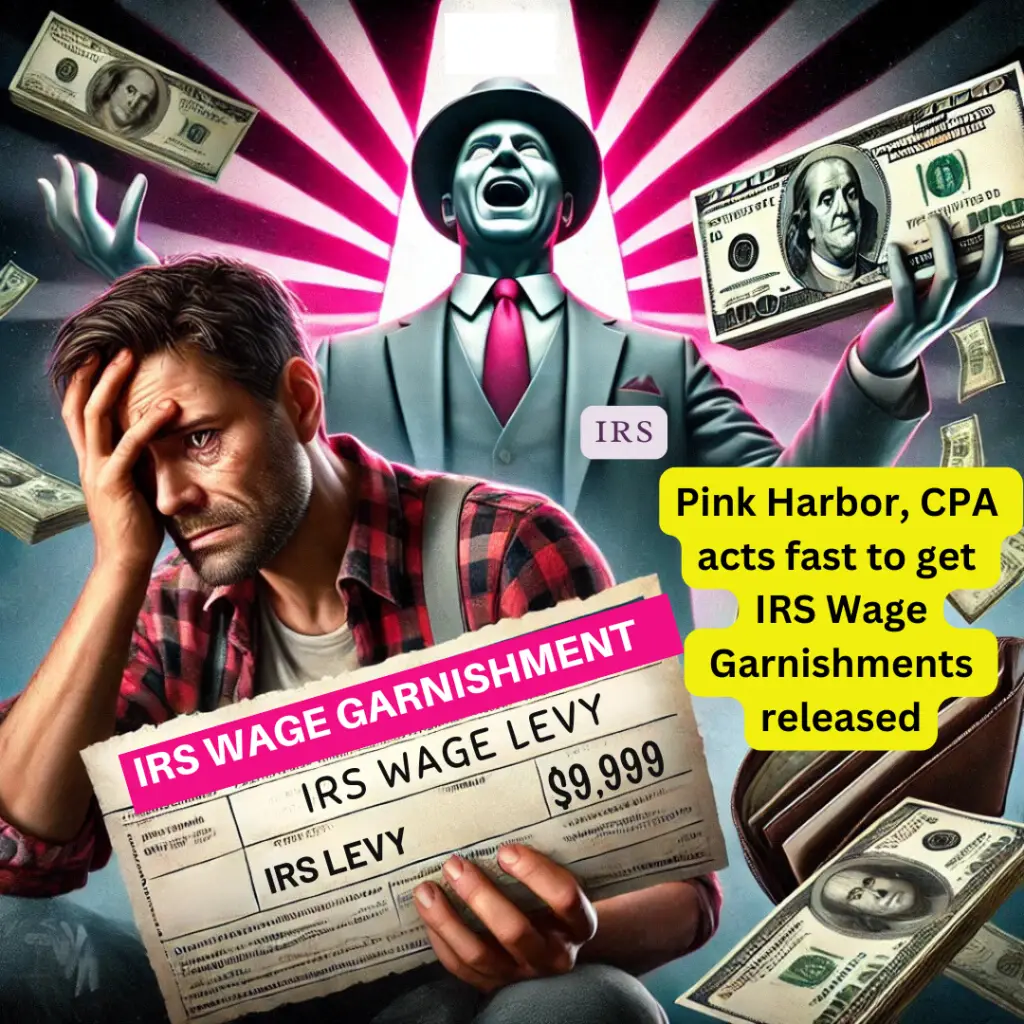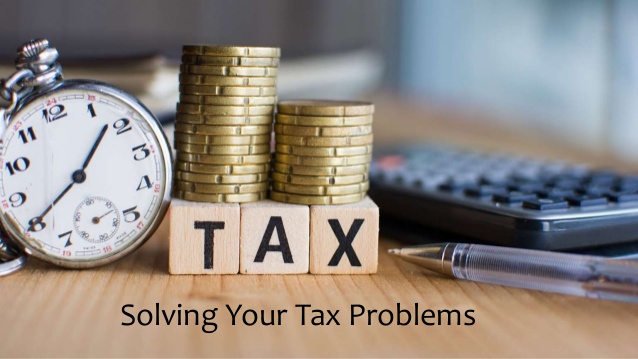
375 North Main Street Suite A-5
Williamstown NJ 08094
(856) 226-9524
mike@pinkharbor.com
Mon - Fri 9 AM - 5 PM
Night & Weekend Hours by Appointment

Williamstown NJ 08094
mike@pinkharbor.com
Night & Weekend Hours by Appointment
Dealing with IRS Wage Garnishment can be overwhelming, but you do not have to face it alone. Pink Harbor, Certified Public Accounting, specializes in providing fast and effective solutions to help stop wage garnishment, address an IRS wage levy, and protect your paycheck. Whether you are struggling to find wage garnishment relief or need assistance to stop IRS garnishment, we act quickly to attempt to secure a levy release. Our experienced team understands the urgency of your situation and works diligently to help you regain financial stability. Contact us today to take the first step toward resolving your tax issues.

📨 CP Letters: The IRS sends a series of CP (Collection Process) notices before wage garnishment begins. These include:
📨 CP501 or CP503: Initial reminders about unpaid taxes.
📨 CP504: Notice of intent to levy, warning that further action will be taken if the debt remains unpaid.
📨 Final Notice of Intent to Levy (LT11): This letter informs you of the IRS’s plan to garnish wages and outlines your right to a Collection Due Process (CDP) hearing.
📨 Form 668-W: Once garnishment begins, this form is sent to your employer to initiate the wage levy.
⚖️ No Court Order Needed: The IRS can garnish wages without a court order, as it has statutory authority to collect unpaid taxes.
🛡️ Exempt Amounts Apply: A portion of your wages is protected from garnishment based on your filing status and number of dependents.
📜 Employer Compliance: Employers are legally obligated to follow the IRS’s garnishment instructions and can face penalties for non-compliance.
🔄 Garnishment Until Paid: Garnishment continues until the debt is fully paid, resolved through negotiation, or released by the IRS.
💸 Immediate Financial Impact: Garnishment can significantly reduce your take-home pay, making it difficult to cover living expenses.
📄 IRS Notification: The IRS notifies your employer about a wage garnishment by sending Form 668-W.
🕒 Prompt Action: Your employer must begin garnishing wages with the next payroll cycle after receiving notice.
📩 Garnishment Termination: The IRS notifies your employer that there is no more wage garnishment by sending Form 668-D.
💰 Fund Transfer: Once payroll has been processed, your employer is legally required to send the garnished funds to the IRS.
An administrative wage garnishment allows federal agencies, including the IRS, to collect debts directly from your paycheck without a court order. Covered under 31 U.S.C. § 3720D, this process is distinct from standard garnishment because it bypasses judicial involvement. The IRS uses this tool when taxpayers fail to resolve debts through voluntary means, like payment plans.
The IRS’s procedures for administrative wage garnishments are detailed in IRM 5.19.4, ensuring compliance with legal guidelines. If this garnishment causes financial hardship, contacting TAS for assistance may provide a solution.
Yes, the IRS can garnish wages, and they don’t need a court order to do so. Under 26 U.S.C. § 6331, the IRS has the authority to issue a levy directly to your employer, requiring them to deduct a portion of your paycheck. This action follows a strict process, including issuing a Final Notice of Intent to Levy and allowing for a 30-day response window.
Tax Court cases, like Livingston v. Commissioner, T.C. Memo. 2000-121, highlight the importance of the IRS adhering to pre-levy procedures. If you act promptly by responding to IRS notices or requesting a CDP hearing, you may be able to prevent garnishment.
The IRS starts garnishing wages after issuing a Final Notice of Intent to Levy, which gives you 30 days to respond or make arrangements. This timeline is mandated under 26 U.S.C. § 6331(d) and ensures taxpayers have a chance to address the debt before garnishment begins.
The Internal Revenue Manual (IRM 5.11.1.2) outlines these steps clearly, emphasizing proper notification. Acting during this 30-day window is crucial to avoid garnishment.
The IRS calculates how much to garnish from your wages using the IRS Wage Garnishment Table. This table determines how much of your income is exempt from garnishment based on your filing status, number of dependents, and standard deduction. The remaining amount is garnished to satisfy the tax debt.
There is no specific cap on garnishment amounts, unlike other creditors. The IRS’s authority under 26 U.S.C. § 6334 allows it to garnish wages above the exempt amount, which can result in significant deductions from your paycheck.
The IRS Wage Garnishment Table is a tool used to determine the portion of your paycheck that is exempt from garnishment. The table considers your filing status and number of dependents to calculate the exempt amount. Any income exceeding this exemption is subject to garnishment under 26 U.S.C. § 6334.
The table is updated annually to reflect changes in the federal poverty guidelines. You can find the most recent table on the IRS website or consult the Taxpayer Advocate Service for assistance.
| Filing Status | EXEMPTION % BY NUMBER OF DEPENDENTS | |||||
|---|---|---|---|---|---|---|
| 0 | 1 | 2 | 3 | 4 | 5 | |
| Single | 20% | 25% | 30% | 35% | 40% | 45% |
| Married Filing Jointly | 25% | 30% | 35% | 40% | 45% | 50% |
| Head of Household | 30% | 35% | 40% | 45% | 50% | 55% |
| Married Filing Separately | 20% | 25% | 30% | 35% | 40% | 45% |
The IRS wage garnishment phone number is 1-800-829-7650, which connects you to the Collections Department.
You can also call 1-800-829-1040 for general assistance with tax issues, including wage garnishments.
You can stop an IRS wage garnishment by taking immediate action. Options include:
💵 Paying the debt in full
📑 Setting up an installment agreement
🛡️ Proving financial hardship
📩 Submitting an Offer in Compromise
Additionally, requesting a Collection Due Process (CDP) hearing can temporarily halt garnishment while your case is reviewed.
Under 26 U.S.C. § 6330, the CDP hearing is a critical opportunity to present your case and negotiate alternative payment arrangements.
No, federal law protects employees from being fired due to a single wage garnishment. However, this protection may not extend to multiple garnishments. The Consumer Credit Protection Act (15 U.S.C. § 1674) ensures job security for individuals facing a single garnishment.
Employers are required to comply with IRS levy notices and cannot take retaliatory actions against employees for fulfilling their legal obligations.
Pink Harbor, CPA offers a variety of IRS tax resolution services designed to help you manage and resolve tax issues. Below are some of the most effective solutions available:
| ✔️ IRS Offer-in-Compromise | Settle your tax debt for less than the full amount owed, based on your financial situation. |
| ✔️ IRS Installment Plans | Spread out your tax payments over time with an installment agreement, making it easier to pay off your debt. |
| ✔️ Filing Back Taxes – Tax Compliance | Ensure compliance by filing past-due tax returns and addressing penalties for late filing. |
| ✔️ IRS Innocent Spouse Relief | Avoid liability for tax debt if your spouse is solely responsible for incorrect or fraudulent reporting. |
| ✔️ IRS Injured Spouse Relief | Reclaim your share of a tax refund that was applied to your spouse’s past debts, such as child support or student loans. |
| ✔️ IRS Penalty & Interest Abatement | Reduce or eliminate IRS penalties and interest if you can prove reasonable cause for late payments or filings. |
| ✔️ IRS Currently Not Collectible Status | Temporarily delay IRS collection activities if you are unable to pay your tax debt due to financial hardship. |
Pink Harbor, CPA provides expert help to resolve a wide range of tax issues. Some of the most common problems we can assist with include:
| 🛡️ IRS Audit Representation | Get professional representation during an IRS audit to ensure your rights are protected and you receive fair treatment. |
| 🛡️ IRS Lien Withdrawal | Remove a tax lien placed on your property and restore your financial standing with the IRS. |
| 🛡️ IRS Levy Release | Stop the IRS from seizing your assets, such as bank accounts or wages, to pay off tax debt. |
| 🛡️ IRS Wage Garnishment Release | Protect your paycheck by stopping or reducing wage garnishment by the IRS. |
| 🛡️ IRS Trust Fund Recovery Relief | Resolve tax issues related to unpaid payroll taxes or trust fund penalties, often incurred by business owners. |
A wage garnishment is when the IRS or State sends a notice to your employer to withhold a portion of your net payroll, and to turn that withholding over to the IRS or State directly. The wage garnishment will remain in place until either the tax debt is satisfied, or until the IRS or State notify the employer to either change or eliminate that wage garnishment.
Not only is it embarrassing to you for the IRS or State to notify your employer of your personal tax situation, the deduction from your pay will almost always leave you with not enough money to pay your normal bills. This is because the amount of the wage garnishment is calculated for the maximum benefit of the IRS or State, not you. Fortunately, IRS and State wage garnishment relief is often easy to obtain.
Pink Harbor, CPA can assist you with obtaining IRS or State wage garnishment relief. We work fast and efficiently so that outcomes are achieved quickly. Our extensive knowledge, experience and dedication to continuing education limit often limit the amount of tax research needed on each case, which in turn keeps your bill lower. Watch our video below. Then, visit our YouTube channel for all our other informative videos on taxes, accounting and consulting.


Enter your information below for our FREE e-guide “Pink Harbor CPA’s blueprint to resolving your tax problems.”
